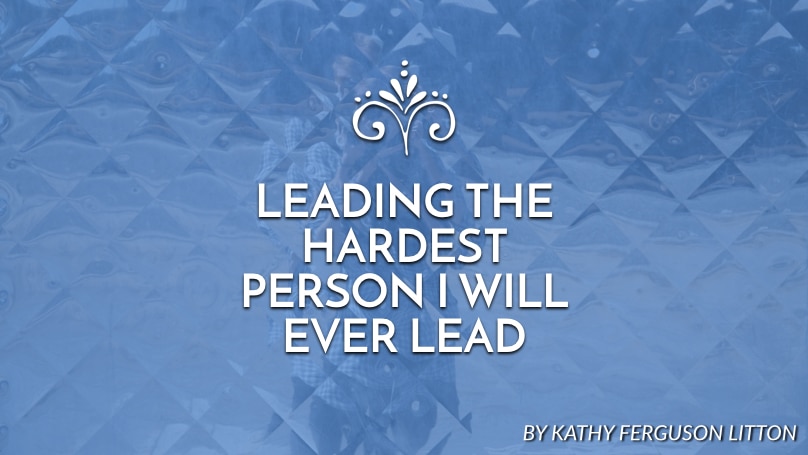The face in the mirror is the person hardest for me to lead. Yet I have learned in leading her well, I will lead others more fully.
The first time I heard the term “self leadership” was from a 2001 Christianity Today article written by Bill Hybels. This was the question that grabbed me: “Who is your toughest leadership challenge?” His reply? “Yourself.” I knew instinctively he was right. I had been a leader long enough to recognize the problem of leading myself.
What is self-leadership? The most basic definition of self-leadership is: The practice of intentionally influencing your thinking, feeling and behaviors to achieve your objectives.
Bill Hybels quoted business guru Dee Hock, “We should invest 50 percent of our leadership amperage into the task of leading ourselves; and the remaining 50 percent should be divided into leading down, leading up, and leading laterally.” At first Bill resisted the idea of 50 percent of his leadership going into himself . . . but eventually he concluded Dee Hock was correct.
Samuel Rima, author of Leading From the Inside Out says this, “The way in which a leader conducts his personal life does, in fact, have a profound impact on his ability to exercise effective public leadership. There is a direct correlation between self-leadership and public leadership.”
Let me remind you what leadership is—it is intentional influence. If you have enlisted, influenced, persuaded, instructed, organized or mediated, you are a leader. If you are reading this blog, you are a leader.
Self-leadership says I want to steward and maximize my leadership impact. As Rima says—there is correlation between our self leadership and our public leadership.
If you think this is all sounds a bit ungodly or self-focused, let me remind you of something—NO industry should take their leadership capacity as seriously as believers who want to advance the gospel for His glory. Neither Wall Street, Main Street nor the White House has eternal matters at stake. The church does, and we are leaders in His church.
To intentionally influence ourselves, we must pursue honest evaluation and assessment.
Self-leadership begins by asking ourselves piercing questions.
- Do I walk in the Spirit? Oswald Sanders says, “Spiritual leadership requires Spirit-filled people.” To be filled with the Spirit means simply that we voluntarily surrender life and will to the Spirit. When we are controlled by the spirit our mind, emotions, will and physical strength all become available for the Spirit to guide and use. Leaders need to be under the control of the Holy Spirit, not depending on their own strength, wisdom or talent. In fact, I am pretty convinced most people in roles of spiritual leadership burn out or fail when they try to sustain leadership solely on their own strength.
“Therefore, brethren, select from among you seven men of good reputation, full of the Spirit and of wisdom, whom we may put in charge of this task” Acts 6:3 (NASB).
- Is my character submitted to Christ? Character matters. Talent and skill pale in light of compromise and inconsistency. Integrity speaks volumes. Our character is on full display as we interact, respond and connect with real people, real problems, and real failures. In other words . . . what we ACTUALLY DO, not merely what we say. Make no mistake about this—people really do see through the beautiful song or effective teaching given by a woman who is dishonest, unkind, mean spirited or profoundly arrogant. You may have performed, but you weren’t leading anyone.
“He who walks with integrity, and works righteousness, and speaks truth in his heart” Psalm 15:2.
- Do I remain a learner? Leaders are learners. We make an investment into the potential of our long-term influence and leadership when we never stop learning. Whether it is in the Word of God or reading biographies or subscribing to Fast Company—we must remain curious and open to fresh ideas, coaching tips, new perspectives or resilient truths that transcend time. No leader today who wants to influence all generations will coast in learning intellectually, spiritually or culturally. Culture, thought and ideas move too fast these days—real leaders will not be left behind.
“A wise man will hear and increase in learning” Proverbs 1:5.
- Do I accept responsibility? If we struggle to own our actions and face consequences, we are not demonstrating maturity. Those are the actions of children. If we cannot receive correction or face a negative evaluation it screams emotional immaturity and lack of leadership.
“He who conceals his transgressions will not prosper, But he who confesses and forsakes them will find compassion.” Proverbs 28:13.
- Do I practice self-discipline? People who make an impact use time, talents and resources as fully as possible. It takes self-control and disciple to steward all the resources God has entrusted us with. Just as city walls guard all the resources and riches of a city, likewise our self-control keeps our gifts, talents and time from being plundered and wasted. Dare we discuss how the much time is plundered with Facebook, online shopping, etc?
“A man without self-control is like a city broken into and left without walls” Proverbs 25:28.
- Do I care for myself? Michael Hyatt writes, “Some people put themselves at the bottom of their priorities list, but I think this is a false—and very dangerous—piety. We are in a much better position to serve others when our basic spiritual, emotional and physical needs are met.” This means sleep, exercise and healthy food are critically important. Watch the emotional, physical and spiritual gauges of your life—if they all hit empty at one time—disaster may occur. The ministry world has learned to hard way about burnout. Healthy leaders not only take care of themselves they seek life-giving pursuits that invigorate their body, soul and spirit.
“Beloved, I pray that in all respects you may prosper and be in good health, just as your soul prospers“ 3 John 1:2.
- Do I lead my heart or follow it? Are your emotions in the driver’s seat of your decisions, reactions or words? Do you see a trail of broken relationships, bad ideas, regrettable conversations or angry outbursts in the rear view mirror? Do you make decisions or come to conclusions based almost exclusively on how things feel to you? If this is true you aren’t leading your emotions—they are leading you.
“He who is slow to anger is better than the mighty, and he who rules his spirit, than he who captures a city” Proverbs 16:32.
- Do I regularly seek counsel or input? Good leaders value collaboration and insight from others. If insecurity or pride keeps you from valuing input your may miss the best solutions or fresh ideas. Collaboration creates buy in, creates community and helps train new leaders. When different ideas, perspectives and understanding merge greater insight is gained.
“Where there is no guidance the people fall, But in abundance of counselors there is victory” Proverbs 11:14.
Like you, I want God to use me to advance to gospel That includes using my leadership.
How are you seeking to lead yourself well?
Published March 20, 2017



